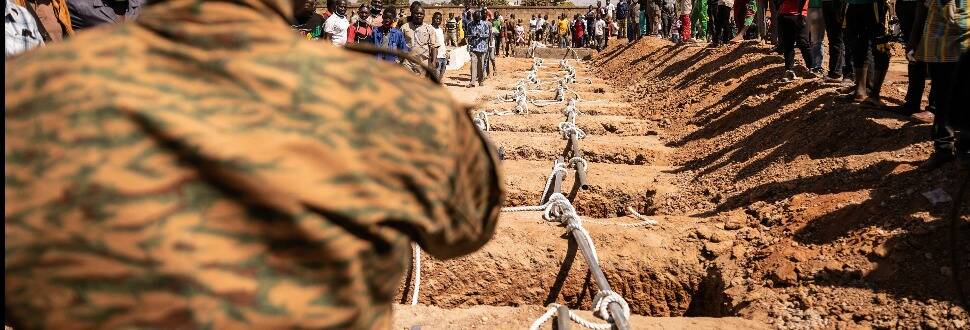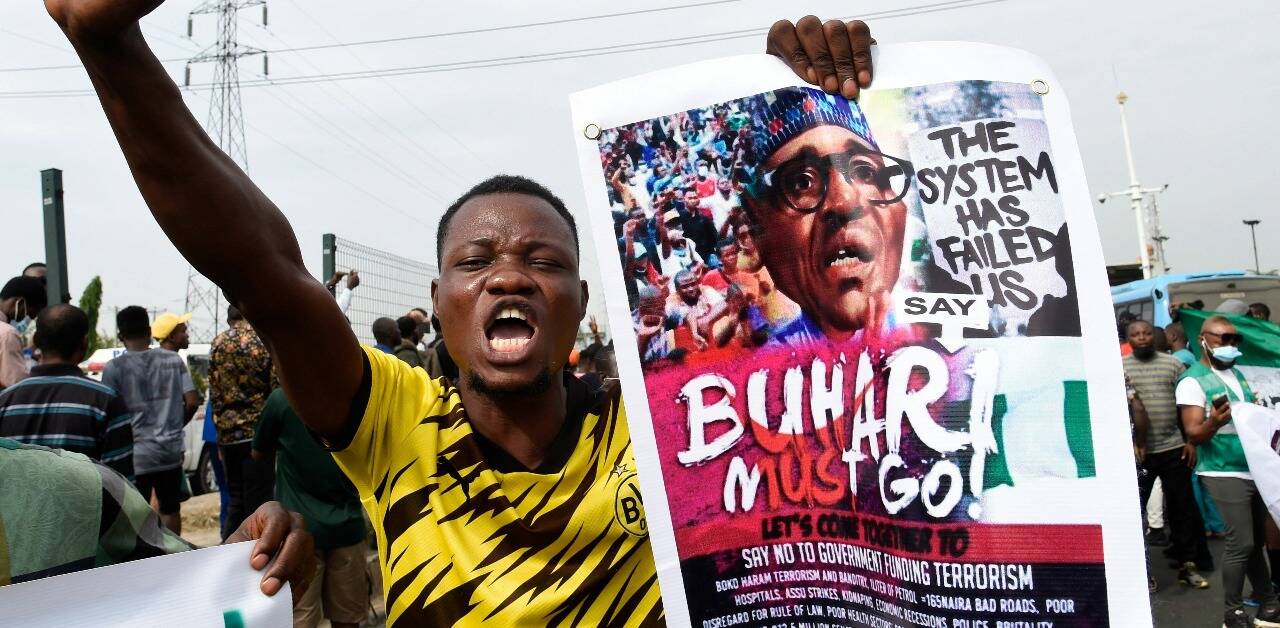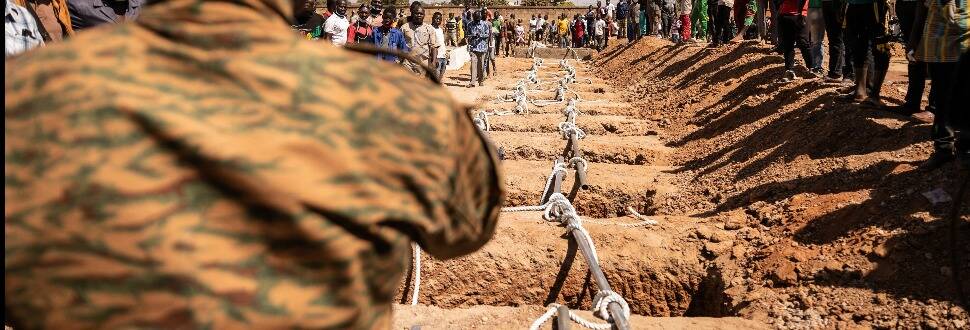Images: Getty Images (Kola Sulaimon; Pius Utomi Ekpei)
Scroll down


The region faces an outlook in which regime instability and weakening governance will become more pressing issues, not just in traditionally unstable states, but also some of the region’s previous beacons of stability.
Similar dynamics are at play elsewhere in the region. We forecast that Senegal and Ghana, two of West Africa’s most stable countries, are likely to see previously-rare mass protests in 2022. In both countries, poor socio-economic conditions are a key driver of anti-government sentiment. High debt levels and the lingering economic impact of the Covid-19 pandemic mean that cuts to subsidies and government spending are likely, which we anticipate would add to public grievances. In Senegal, the government’s ongoing attempts to interfere with opposition activities are also likely to continue to backfire, encouraging rather than deterring public displays of dissent.
Systemic stability issues are unlikely in either Ghana or Senegal, however. But the optics of large opposition protest movements developing in Ghana, Nigeria and Senegal would probably have implications far beyond their borders. Aside from creating a perception that West and Central Africa is becoming a higher-risk and more unstable region, it would probably encourage opposition movements to challenge governments in other countries. This includes those that are much more vulnerable to conflict and severe political instability. Burkina Faso, the DRC, Equatorial Guinea and the Republic of Congo are the countries that we assess are the most exposed and vulnerable to such a contagion effect.
Burkina Faso is the most at risk in our estimation. A spread and intensification of the civil conflict that is already underway in the north, southwest and east is a likely scenario in 2022, as is an overthrow of the government either through a coup or revolution. The security situation in the country has worsened significantly since an uprising in 2014. With the French military planning to scale back its counter-terrorism operation there in the coming year, the Burkinabe state will become even more vulnerable to the violence and influence of militants, and the proliferation of arms from other countries in tumult.
Discontent in the junior ranks of the Burkinabe military – which has prompted sporadic mutinies in recent years – is a potential trigger for coup attempts or, more likely, further mutinies and rebellions. Public concerns with insecurity and governance will almost certainly prompt large demonstrations. Protests over insecurity have already started to build a following in Ouagadougou. In this context, President Roch Kabore is unlikely to still be in place by the end of 2022. But it is also unlikely that a change in government would do much to improve the situation. Persistent instability and a spread of jihadist violence and conflict are, unfortunately, a more likely outcome.

In 2021, 39% of Nigerians were living below the international poverty line, according to the World Bank.
The probability of similar regime instability unfolding in Equatorial Guinea or the Republic of Congo is much lower. But the ageing presidents and the dire economic outlooks for both countries (spurned by the shocks to oil prices due to the pandemic) mean we assess that it is still within reasonable possibility. For both, such a scenario would be a marked change following many years of comparative stability and predictability.
Currently there are few public signs that domestic opposition groups in either Equatorial Guinea or the Republic of Congo are well organised due to years of repression. As such, we anticipate any popular campaign would probably come about organically, in response to triggers similar to those we outlined for Nigeria, such as police violence, or food or fuel price shocks. The military would be most likely to instigate any regime change in such a scenario, through a coup.
A regional trend of spreading insecurity with more-overt opposition to sitting governments is also likely to impact the DRC. A splintering of the governing Union Sacre coalition is probable later in the year, as campaigning for a 2023 presidential election gets underway. Existing disputes over electoral law reforms that potentially exclude popular opposition candidates are a key point that will determine the potential for unrest.
Coup attempts seem unlikely in response to any political disputes in the DRC in 2022, however. The threat from the military seems to have waned in previous years, as the influence of the former president, Joseph Kabila, has dwindled. Instead, we assess the threat of disruption and instability stems largely from popular opposition figures, such as Martin Fayulu, and their ability to mobilise large numbers of supporters.
With these challenges, 2022 will lay the road for 2023 and beyond being even more challenging in West and Central Africa. The region faces an outlook in which regime instability and weakening governance will become more pressing issues, not just in traditionally unstable states, but also some of the region’s previous beacons of stability.◼




The region faces an outlook in which regime instability and weakening governance will become more pressing issues, not just in traditionally unstable states, but also some of the region’s previous beacons of stability.
The probability of similar regime instability unfolding in Equatorial Guinea or the Republic of Congo is much lower. But the ageing presidents and the dire economic outlooks for both countries (spurned by the shocks to oil prices due to the pandemic) mean we assess that it is still within reasonable possibility. For both, such a scenario would be a marked change following many years of comparative stability and predictability.
Currently there are few public signs that domestic opposition groups in either Equatorial Guinea or the Republic of Congo are well organised due to years of repression. As such, we anticipate any popular campaign would probably come about organically, in response to triggers similar to those we outlined for Nigeria, such as police violence, or food or fuel price shocks. The military would be most likely to instigate any regime change in such a scenario, through a coup.
A regional trend of spreading insecurity with more-overt opposition to sitting governments is also likely to impact the DRC. A splintering of the governing Union Sacre coalition is probable later in the year, as campaigning for a 2023 presidential election gets underway. Existing disputes over electoral law reforms that potentially exclude popular opposition candidates are a key point that will determine the potential for unrest.
Coup attempts seem unlikely in response to any political disputes in the DRC in 2022, however. The threat from the military seems to have waned in previous years, as the influence of the former president, Joseph Kabila, has dwindled. Instead, we assess the threat of disruption and instability stems largely from popular opposition figures, such as Martin Fayulu, and their ability to mobilise large numbers of supporters.
With these challenges, 2022 will lay the road for 2023 and beyond being even more challenging in West and Central Africa. The region faces an outlook in which regime instability and weakening governance will become more pressing issues, not just in traditionally unstable states, but also some of the region’s previous beacons of stability.◼
In 2021, 39% of Nigerians were living below the international poverty line, according to the World Bank.
Similar dynamics are at play elsewhere in the region. We forecast that Senegal and Ghana, two of West Africa’s most stable countries, are likely to see previously-rare mass protests in 2022. In both countries, poor socio-economic conditions are a key driver of anti-government sentiment. High debt levels and the lingering economic impact of the Covid-19 pandemic mean that cuts to subsidies and government spending are likely, which we anticipate would add to public grievances. In Senegal, the government’s ongoing attempts to interfere with opposition activities are also likely to continue to backfire, encouraging rather than deterring public displays of dissent.
Systemic stability issues are unlikely in either Ghana or Senegal, however. But the optics of large opposition protest movements developing in Ghana, Nigeria and Senegal would probably have implications far beyond their borders. Aside from creating a perception that West and Central Africa is becoming a higher-risk and more unstable region, it would probably encourage opposition movements to challenge governments in other countries. This includes those that are much more vulnerable to conflict and severe political instability. Burkina Faso, the DRC, Equatorial Guinea and the Republic of Congo are the countries that we assess are the most exposed and vulnerable to such a contagion effect.
Burkina Faso is the most at risk in our estimation. A spread and intensification of the civil conflict that is already underway in the north, southwest and east is a likely scenario in 2022, as is an overthrow of the government either through a coup or revolution. The security situation in the country has worsened significantly since an uprising in 2014. With the French military planning to scale back its counter-terrorism operation there in the coming year, the Burkinabe state will become even more vulnerable to the violence and influence of militants, and the proliferation of arms from other countries in tumult.
Discontent in the junior ranks of the Burkinabe military – which has prompted sporadic mutinies in recent years – is a potential trigger for coup attempts or, more likely, further mutinies and rebellions. Public concerns with insecurity and governance will almost certainly prompt large demonstrations. Protests over insecurity have already started to build a following in Ouagadougou. In this context, President Roch Kabore is unlikely to still be in place by the end of 2022. But it is also unlikely that a change in government would do much to improve the situation. Persistent instability and a spread of jihadist violence and conflict are, unfortunately, a more likely outcome.
